
Hỏa Lò Prison was a prison in Hanoi originally used by the French colonists in Indochina for political prisoners, and later by North Vietnam for U.S. prisoners of war during the Vietnam War. During this later period, it was known to American POWs as the "Hanoi Hilton". Following Operation Homecoming, the prison was used to incarcerate Vietnamese dissidents and other political prisoners, including the poet Nguyễn Chí Thiện. The prison was demolished during the 1990s, although its gatehouse remains a museum.

James Bond Stockdale was a United States Navy vice admiral and aviator who was awarded the Medal of Honor in the Vietnam War, during which he was a prisoner of war for over seven years.

Jeremiah Andrew Denton Jr. was an American politician and military officer who served as a U.S. Senator representing Alabama from 1981 to 1987. He was the first Republican to be popularly elected to a Senate seat in Alabama. Denton was previously a United States Navy rear admiral and naval aviator taken captive during the Vietnam War.
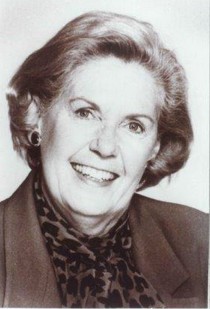
Sybil Elizabeth Stockdale was an American campaigner for families of Americans missing in South East Asia.

Brigadier General James Robinson "Robbie" Risner was a fighter pilot in the United States Air Force, and a senior leader among U.S. prisoners of war during the Vietnam War.
The tap code, sometimes called the knock code, is a way to encode text messages on a letter-by-letter basis in a very simple way. The message is transmitted using a series of tap sounds, hence its name.

George Thomas Coker is a retired United States Navy commander who was awarded the Navy Cross for extraordinary heroism as a prisoner of war (POW) during the Vietnam War. An Eagle Scout, he is noted for his devotion to Scouting.
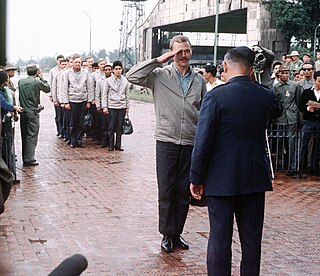
Operation Homecoming was the return of 591 American prisoners of war (POWs) held by North Vietnam following the Paris Peace Accords that ended U.S. involvement in the Vietnam War.

John Arthur Dramesi was a United States Air Force (USAF) colonel who was held as a prisoner of war from 2 April 1967 to 4 March 1973 in both Hoa Lo Prison, known as "The Hanoi Hilton", and Cu Loc Prison, "The Zoo", during the Vietnam War.

Return with Honor is a 1999 documentary film about U.S. prisoners of war during the Vietnam War. Among those profiled is Senator John McCain. It is narrated by Tom Hanks.
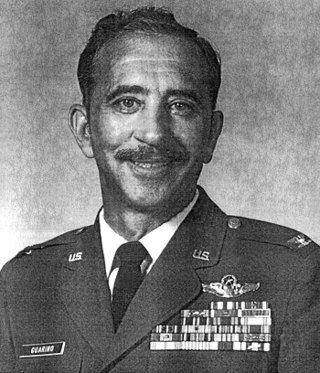
Lawrence Nicholas "Larry" Guarino was a United States Air Force officer, and veteran of three wars. Shot down on his 50th combat mission, he spent more than eight years as a prisoner of war (POW) during the Vietnam War and earned the Air Force Cross.

John Heaphy "Jack" Fellowes was a U.S. Navy captain, pilot who became a prisoner of war (POW) during the Vietnam War. He was known as "Happy Jack" because of his infectious sense of humor, which he maintained even while a POW. He was awarded the Silver Star for his "conspicuous gallantry and intrepidity" while a POW, credited with "contributed significantly toward the eventual abandonment of harsh treatment by the North Vietnamese".
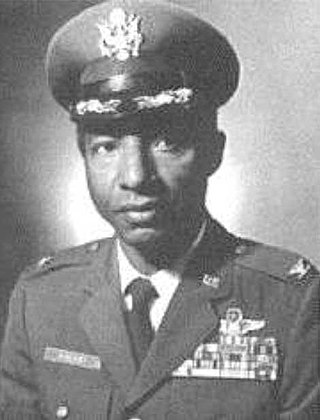
Fred Vann Cherry was a colonel and command pilot in the U.S. Air Force. A career fighter pilot, he served in the Korean War and the Vietnam War.
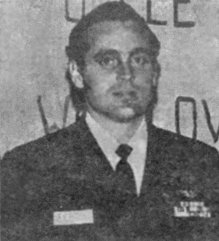
The Alcatraz Gang was a group of eleven American prisoners of war (POW) held separately in Hanoi, North Vietnam during the Vietnam War because of their particular resistance to their North-Vietnamese military captors. These eleven POWs were: George Thomas Coker, USN; Jeremiah Denton, USN; Harry Jenkins, USN; Sam Johnson, USAF; George McKnight, USAF; James Mulligan, USN; Howard Rutledge, USN; Robert Shumaker, USN; James Stockdale, USN; Ron Storz, USAF; and Nels Tanner, USN.
The Hanoi March was a propaganda event held on July 6, 1966, involving U.S. prisoners of war during the Vietnam War. During the march, members of the North Vietnamese Army paraded 52 American POWs through the streets of Hanoi before tens of thousands of North Vietnamese civilians. The march soon deteriorated into near riot conditions, with North Vietnamese civilians beating the POWs along the 2 miles (3.2 km) route and their guards largely unable to control the melee.
Members of the United States armed forces were held as prisoners of war (POWs) in significant numbers during the Vietnam War from 1964 to 1973. Unlike U.S. service members captured in World War II and the Korean War, who were mostly enlisted troops, the overwhelming majority of Vietnam-era POWs were officers, most of them Navy, Air Force, and Marine Corps airmen; a relatively small number of Army enlisted personnel were also captured, as well as one enlisted Navy seaman, Petty Officer Doug Hegdahl, who fell overboard from a naval vessel. Most U.S. prisoners were captured and held in North Vietnam by the People's Army of Vietnam (PAVN); a much smaller number were captured in the south and held by the Việt Cộng (VC). A handful of U.S. civilians were also held captive during the war.

Hayden James Lockhart is a retired United States Air Force officer who is best known for being the first U.S. Air Force pilot to be shot down in North Vietnam.

USS Jeremiah Denton (DDG-129) is a planned Arleigh Burke-class guided missile destroyer of the United States Navy, the 79th overall for the class. She will be named in honor of former U.S. Senator for Alabama and retired Rear Admiral Jeremiah Denton, a Vietnam War veteran and prisoner of war, who was a recipient of the Navy Cross. Jeremiah Denton will be the fourth ship of the Flight III series.

Phillip Neal "Phil" Butler is a retired United States Naval officer and pilot. He was the eighth-longest-held U.S. prisoner of war (POW) held in North Vietnam during the Vietnam War. Butler, who was forced to eject after a mid-air explosion on April 20, 1965, was a prisoner of war in North Vietnam until his release as part of Operation Homecoming in 1973. Butler was one of the five POWs credited with establishing the tap code. The code enabled the prisoners to communicate with each other.
Ronald E. Storz was a United States Air Force pilot and recipient of the Air Force Cross who died in captivity as a prisoner of war during the Vietnam War.
















